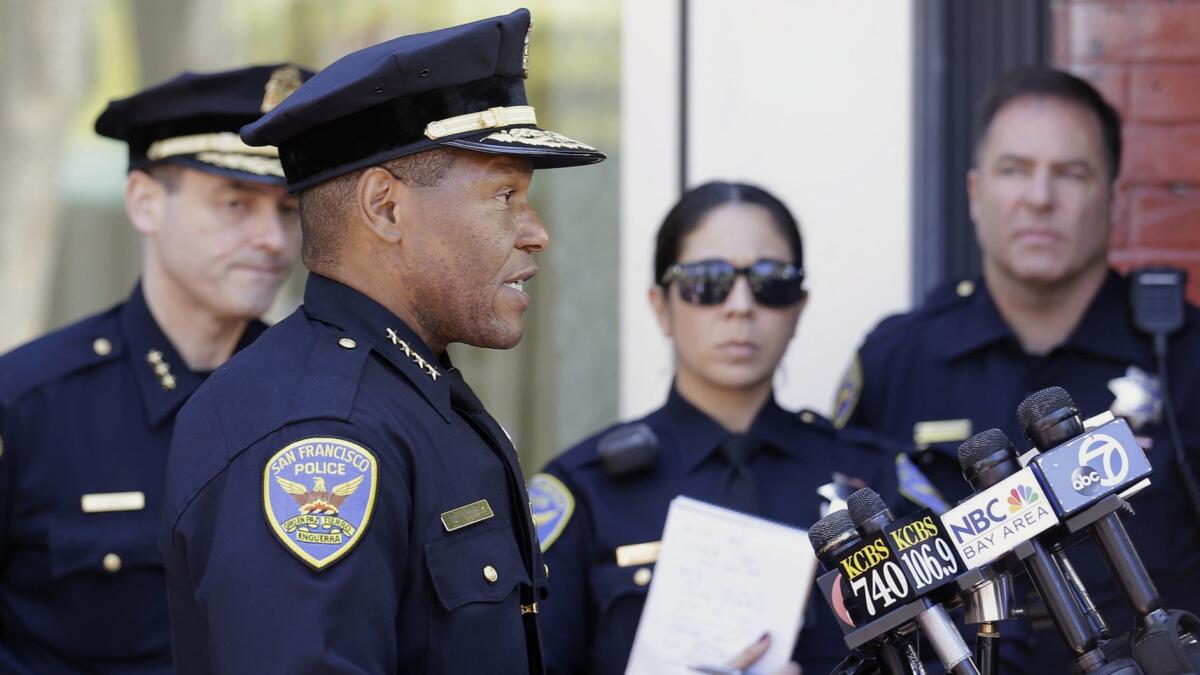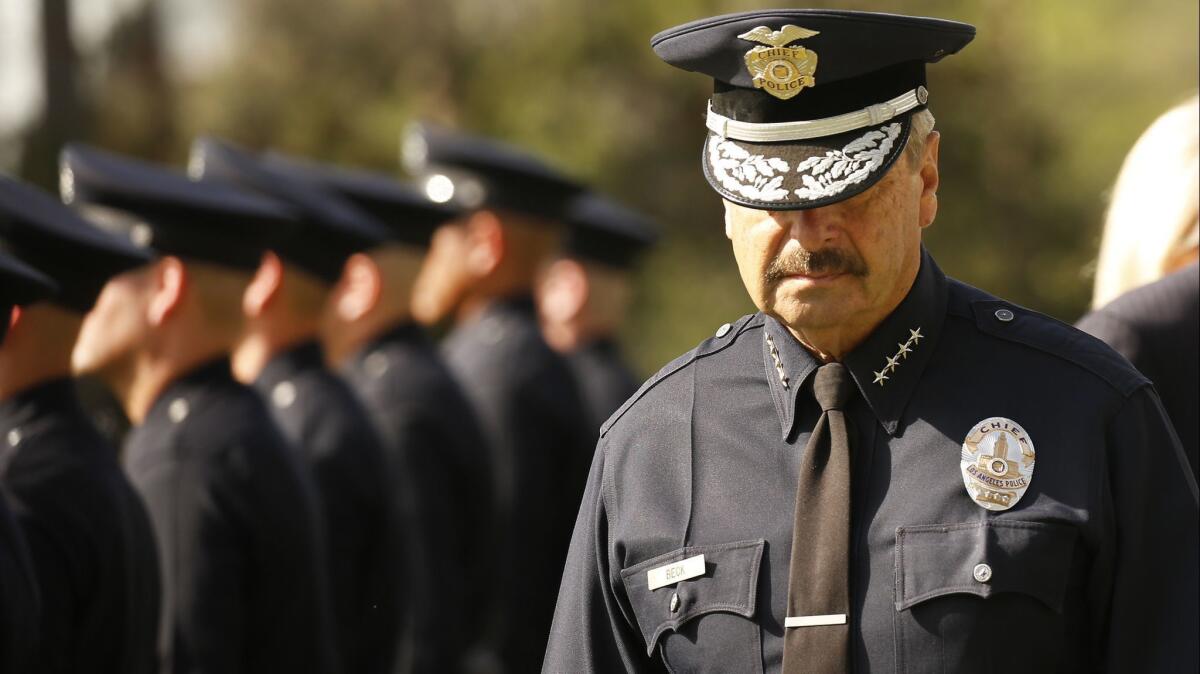Interviews start in search for LAPD’s next chief; focus is on department veterans
- Share via
The nationwide hunt for L.A.’s next police chief has narrowed to a handful of contenders who have deep ties to the Los Angeles Police Department, likely setting the stage for a department veteran to get the job.
The Police Commission, the civilian panel that oversees the LAPD, began conducting closed-door interviews Wednesday morning, a source familiar with the process confirmed.
The source, who was not authorized to speak publicly about the confidential search and requested anonymity, confirmed that the list of candidates being interviewed includes LAPD Assistant Chief Michel Moore, Deputy Chief Robert Arcos, Deputy Chief Phil Tingirides and former Assistant Chief Sandy Jo MacArthur.
But more than four interviews would take place Wednesday, the source said.
Another source, who also requested anonymity, said San Francisco Police Chief Bill Scott was also scheduled to be interviewed. Scott’s name had repeatedly surfaced in speculation about the applicants, both in L.A. and San Francisco. The other four candidates had publicly stated that they applied for the job.

The interviews mark a key step in the months-long search for the next LAPD chief and indicate that the Police Commission will probably send Mayor Eric Garcetti its top three candidates well ahead of schedule. Chief Charlie Beck retires June 27; commissioners have said they hoped to give Garcetti their list around June 1.
Thirty-one people applied for the job. Beck, along with some police commissioners and City Council members, have said they believe a department insider — or someone who recently left the LAPD — would be best equipped to lead a police force for a city as sprawling and diverse as Los Angeles. The candidates include a woman, a Latino and an African American.
Garcetti has also signaled that he might prefer someone with a long history at the LAPD.
“I certainly do see a wealth of talent inside the LAPD and with alums of the LAPD, so I’m not worried that we won’t be able to find a great chief,” he said in January at a news conference announcing Beck’s retirement.
RELATED: The LAPD’s next chief will have to meet a long list of demands from city residents »
Beck, the son of an LAPD deputy chief, is a consummate insider. The selection of another insider as his successor would show that the LAPD is in an era of “consolidating and building” rather than wholesale change, said Raphael Sonenshein, executive director of the Pat Brown Institute for Public Affairs at Cal State L.A.
Outsiders have been chosen to lead the LAPD in times of crisis. Willie Williams came from Philadelphia as an African American police chief charged with bringing a racially fractured city together after the 1992 riots.
Beck’s predecessor, William J. Bratton, was chosen to reform an LAPD under federal oversight after the Rampart corruption scandal, which resulted in the overturning of more than 100 criminal convictions. The other two finalists competing against Bratton in 2002 were outsiders as well.
“When Bratton was brought in, it was kind of to change everything, to turn everything upside down, and there was a pretty big appetite for that,” Sonenshein said.
Selecting Beck’s replacement will be one of the most closely watched decisions made by Garcetti — one laced with sensitive matters of race and gender, as well as ever-present concerns about crime rates, now heightened by the mayor’s potential presidential bid. Garcetti will select the chief from the three finalists chosen by the Police Commission, and the City Council will then vote on Garcetti’s choice.
The commissioners embarked on a citywide listening tour earlier this year, soliciting input at community meetings, City Hall and in smaller, more private settings. During the public forums, many residents and elected officials emphasized the importance of hiring someone who is familiar with L.A.’s diverse neighborhoods and can relate to the people who live there. It was also important, some said, for the next chief to understand the history of the city’s still-evolving relationship with the police.
The next LAPD chief will have to confront some of the most intractable problems facing the city and policing overall, including ongoing concerns over how officers use force, a sharp rise in homelessness, allegations of racial profiling, a stubborn uptick in crime and friction with a White House angry at the city’s “sanctuary” policies that limit cooperation with immigration agents.
Beck, who followed his father’s footsteps in joining the LAPD and forged a career that spanned four decades, announced in January that he would step down before the end of his second, and final, five-year term. The speculation over his successor began almost immediately.

Moore leads the LAPD’s patrol operations and is known as a detail-oriented manager with a mastery of crime statistics. Early in his career, he developed a version of the computerized crime-mapping systems that are heavily used today. In 2000, he was assigned to clean up the Rampart Division after the corruption scandal there.
Moore’s father was Basque, and he is listed as Hispanic on department rosters, but his heritage has not played a significant role in defining him in the department. He was one of the three finalists for police chief in 2009, when Beck was selected.
Arcos, who is Latino, heads the LAPD’s Central Bureau, which includes downtown and heavily immigrant neighborhoods in the eastern part of the city. That has put him at ground zero for two of the department’s most pressing issues: homelessness and fears of deportation among immigrant residents. He was a platoon leader in the LAPD’s elite Metropolitan Division before rising to captain in the Olympic and 77th Divisions. When asked why he wanted to be chief, he cited his affection for the department and city: “They mean a lot to me,” he said.
Tingirides is one of two deputy chiefs in charge of the LAPD’s South Bureau, which polices much of South Los Angeles. As a captain in Southeast Division, he oversaw a community policing program that brought youth football and Girl Scouts to Watts housing developments and is credited with reducing homicides there.
MacArthur joined the LAPD in 1980, when there were few female police officers. She rose through the ranks, becoming the first woman to head the department’s training academy and also helping to implement reforms required by the consent decree. In 2009, she was promoted to assistant chief in charge of administrative services by Beck in a command shake-up shortly after he became chief; Moore was also among those promoted. She retired in 2015 and is still a reserve LAPD officer.
Scott was the LAPD’s highest-ranking African American officer when he left in 2017 to lead the San Francisco Police Department, which was reeling from a scandal involving racist texts sent by police officers. In his 27 years at the LAPD, Scott helped oversee the consent decree reforms and finished his career as a deputy chief in South Bureau. An Alabama native, he is now working to implement reforms recommended by the U.S. Department of Justice in San Francisco.
Moore, Tingirides, MacArthur and Scott did not respond to requests seeking comment.
UPDATES:
4:10 p.m.: This article was updated with additional details about the candidates and comments.
9:30 a.m.: This story was updated with information about another candidate being interviewed.
This story was originally published at 7:45 a.m.
More to Read
Sign up for Essential California
The most important California stories and recommendations in your inbox every morning.
You may occasionally receive promotional content from the Los Angeles Times.











